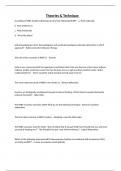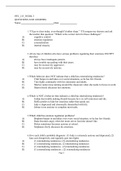Externalizing tendencies - Study guides, Class notes & Summaries
Looking for the best study guides, study notes and summaries about Externalizing tendencies? On this page you'll find 23 study documents about Externalizing tendencies.
Page 3 out of 23 results
Sort by

-
Experiencing the Lifespan 3rd Edition by Belsky -Test Bank
- Exam (elaborations) • 124 pages • 2023
-
- $14.49
- + learn more
Neither Ramona nor Judy, both age 8, are able to get along with their classmates, although they 1. have very different personalities. The school counselor has told the teacher that Ramona has externalizing tendencies, while Judy has internalizing tendencies. What behaviors would you expect from Ramona and Judy? What is the self-esteem risk for each girl? 2. Max is an exuberant child who has a very high opinion of himself and always seems to be in the center of any activity, whether...

-
Theories & Technique
- Exam (elaborations) • 22 pages • 2024
-
- $12.49
- + learn more
Theories & Technique According to REBT, healthy individuals do all of the following EXCEPT: - a. Think rationally b. Have preferences c. Think irrationally d. *All of the above* Self-demandingness other demandingness and world-demandingness describe dyfunction in which approach? - Rational emotive behavior therapy The role of the counselor in REBT is: - Teacher Holly is very concerned with her appearance and thinks that if she sets foot out of her house without makeup, people wo...

-
PSY_215_WEEK 3 QUESTIONS AND ANSWERS...100% CORRECT
- Exam (elaborations) • 43 pages • 2022
-
- $7.39
- + learn more
teacher that question.” Which is the correct term for these challenges? A) cognitive control B) emotion regulation C) externalization D) internal tenacity 2. All are true of children who have serious problems regulating their emotions EXCEPT that they: A) always have inadequate parents. B) have trouble succeeding with their peers. C) may be excessively aggressive. D) may be excessively anxious. 3. Which behavior does NOT indicate that a child has externalizing tendencies? A)...

How did he do that? By selling his study resources on Stuvia. Try it yourself! Discover all about earning on Stuvia


